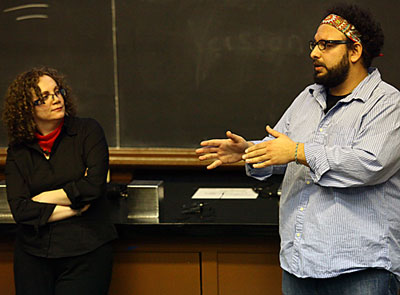 |
| Filmmaker Tarek Abouamin (right) speaks with Dalhousie Professor Amal Ghazal at the "Eyes on Egypt" panel discussion (Bruce Bottomley photo) |
He lived in Egypt for just the first three years of his life, and came to Halifax 16 years ago, by way of Germany and Kuwait. But now all he can think about is going back.
"The veil of fear" in Egypt has been lifted, said filmmaker and NSCAD instructor Tarek Abouamin at Thursday afternoon's "Eyes on Egypt" panel discussion. But that fear, he said, has been the source of much of his work.
At the “Eyes on Egypt” session, presented at Dalhousie by the History Department and the Centre for Foreign Policy Studies, Mr. Abouamin gave one of two compelling Egyptian perspectives on the January 25 revolution.
Abouamin showed a brief scene from his film Gawab, in which an interviewee talks about the overwhelming sense of relief that he feels when he telephones home to Egypt and finds out that his family members are still safe and well. It is this background of fear, instilled by the state, said Mr. Abouamin, which he has been exploring in his films most recently in his new project, 29 Rue d'Armant, which he said will play at the next Halifax Independent Filmmakers Festival in April.
Friday, the day following the discussion, he was to return to Egypt, to film new footage, to be with family, and to be part of the new wave of art that he says will surely be coming out of the country.
The other presenter was Magi Adbul Masih, an Egyptian citizen and Saint Mary’s University religious studies professor, who spoke both about the peaceful and broad-based nature of the revolution as well as the culture of fear that it overturned.
Torture had become such a part of Egyptian culture that it had infiltrated everyday language, she said. But with a “burst of imagination,” she said, this has been broken down.
But what struck her most strongly about the revolution was the way that it brought together Egyptians as one, both Muslim and Christian.
“I have never felt that (unity) in 50 years of my life,” she said.
The presenters were joined in a Q&A session with Saint Mary’s political science professor John Measor and Acadia University history professor Jamie Whidden, as well as the event host, Dalhousie history professor Amal Ghazal.
Dr. Ghazal called the Egyptian uprising a “truly popular revolution” and “very inspiring.”
“This can only have a positive effect,” she said, when asked about the reverberations around the Arab world.
